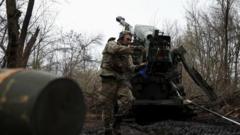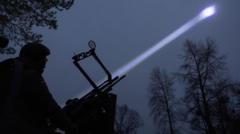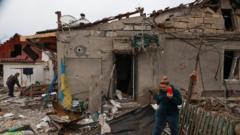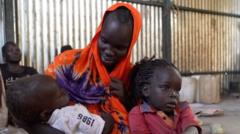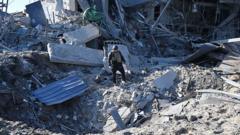*Ukraine's President Volodymyr Zelensky reported the return of North Korean soldiers to active combat in the Kursk region, raising concerns over their substantial casualties and the implications for the Russian military's efforts in the ongoing war.*
**North Korean Troops Reappear on Ukraine's Frontier Amid Intensified Combat**
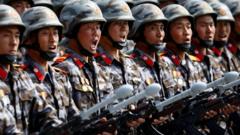
**North Korean Troops Reappear on Ukraine's Frontier Amid Intensified Combat**
*Zelensky reveals North Korean forces are back in battle for Russia, escalating tensions in the ongoing conflict.*
In a recent address, Ukrainian President Volodymyr Zelensky confirmed that North Korean troops have re-entered the conflict zone in Russia's Kursk region after being withdrawn last month due to severe losses. This revelation coincides with new reports asserting that these foreign soldiers are once again taking part in aggressive operations against Ukrainian forces. According to Zelensky, hundreds of both Russian and North Korean military personnel have already been "destroyed" in combat.
Intelligence sources from January indicated that approximately 1,000 of the 11,000 North Korean troops deployed to assist Russia had perished within a span of three months. While North Korean and Russian officials have refrained from making public statements, the involvement of North Korean forces has drawn attention to the precarious state of the battlefield for Russia.
Prior to the re-emergence of North Korean soldiers, Ukrainian special forces in the region reported an absence of North Korean troops for over three weeks, hinting at a potential strategic withdrawal due to significant combat losses faced by these foreign fighters. Moreover, expert analyses suggest that North Korean soldiers, lacking preparation for contemporary warfare, face heightened vulnerability to Ukrainian drone strikes.
North Korean troops were first deployed in response to the deepening alliance between President Vladimir Putin and North Korean leader Kim Jong Un, who have recently solidified their partnership through a security and defense treaty. Reports indicate that North Korea is not only sending troops but also delivering substantial supplies of munitions and weaponry to bolster Russia's dwindling manpower in the war.
As of now, Russia has not disclosed its military casualty figures, with claims made by Ukraine estimating that up to 350,000 Russian soldiers have been killed since the onset of the invasion. Conversely, Zelensky reported Ukrainian losses at 45,100, although various military analysts believe these figures to be understated.
The fighting in Kursk has remained fierce since Ukraine's successful offensive, which saw them reclaim over 1,000 square kilometers of territory six months ago. Despite setbacks faced by Russian troops, Zelensky announced a new round of Ukrainian offensives, claiming to have gained 2.5 kilometers in the ongoing struggle. However, Russian officials contend that their forces have successfully driven back these assaults, with the claims from both sides awaiting independent verification.
In related news, a significant development arose as former U.S. President Donald Trump stated plans to possibly meet with Presidents Zelensky and Putin next week, expressing a desire to see an end to the ongoing war.
Intelligence sources from January indicated that approximately 1,000 of the 11,000 North Korean troops deployed to assist Russia had perished within a span of three months. While North Korean and Russian officials have refrained from making public statements, the involvement of North Korean forces has drawn attention to the precarious state of the battlefield for Russia.
Prior to the re-emergence of North Korean soldiers, Ukrainian special forces in the region reported an absence of North Korean troops for over three weeks, hinting at a potential strategic withdrawal due to significant combat losses faced by these foreign fighters. Moreover, expert analyses suggest that North Korean soldiers, lacking preparation for contemporary warfare, face heightened vulnerability to Ukrainian drone strikes.
North Korean troops were first deployed in response to the deepening alliance between President Vladimir Putin and North Korean leader Kim Jong Un, who have recently solidified their partnership through a security and defense treaty. Reports indicate that North Korea is not only sending troops but also delivering substantial supplies of munitions and weaponry to bolster Russia's dwindling manpower in the war.
As of now, Russia has not disclosed its military casualty figures, with claims made by Ukraine estimating that up to 350,000 Russian soldiers have been killed since the onset of the invasion. Conversely, Zelensky reported Ukrainian losses at 45,100, although various military analysts believe these figures to be understated.
The fighting in Kursk has remained fierce since Ukraine's successful offensive, which saw them reclaim over 1,000 square kilometers of territory six months ago. Despite setbacks faced by Russian troops, Zelensky announced a new round of Ukrainian offensives, claiming to have gained 2.5 kilometers in the ongoing struggle. However, Russian officials contend that their forces have successfully driven back these assaults, with the claims from both sides awaiting independent verification.
In related news, a significant development arose as former U.S. President Donald Trump stated plans to possibly meet with Presidents Zelensky and Putin next week, expressing a desire to see an end to the ongoing war.


